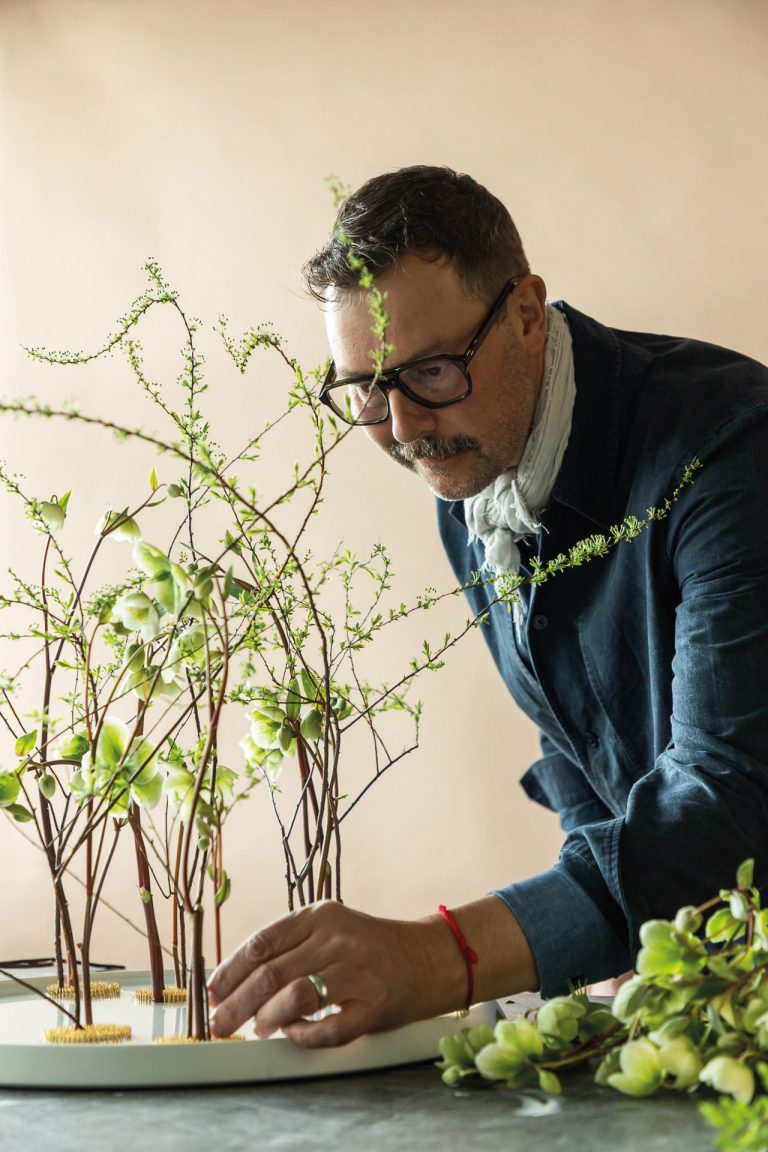
His profound love for flowers began in childhood, deeply influenced by his mother’s flower shop in Berlin. ‘There’s a photo of me, aged three, holding two Bellis perennis. You could say I grew up behind the arranging table,’ Nicolaus remembers. Although his parents initially discouraged him from pursuing floristry, steering him towards gardening instead, he quickly discovered that his true passion was in floral creation, not merely cultivation. Nevertheless, he appreciates the valuable insights his gardening training provided, especially regarding the growth and nature of cut flowers.
A hallmark of Nicolaus’s career is his determination to explore materials beyond traditional floral elements. Over the years, he has experimented extensively with various media, including wax, plaster, and currently, paper. ‘My creations don’t fall into standard categories like table or room decorations. I’ve moved far beyond traditional flower shops. My focus is on object design.’ This unconventional approach sets him apart, reflecting a commitment to continual artistic evolution.
Sogetsu-Ikebana
Sustainability is integral to Nicolaus’s artistic vision, an ethos that permeates all his work. Reflecting on his evolution, he says: ‘My floral art shouldn’t create extra waste. Ideally, everything naturally decomposes. True sustainability for me means using natural materials that return to nature.’ This principle guides
every project he undertakes, from competitive entries to bespoke client commissions.
Nicolaus openly acknowledges the challenges he faces, particularly in meticulous planning and administrative tasks required in competitions. ‘I’m creative. Give me materials, and I’ll create something beautiful. Competitions require careful planning, choosing flowers, and preparation.’ Yet, he thrives in the competitive environment, able to find intense focus and tranquillity once immersed in his work. This remarkable discipline is largely attributed to his training in Sogetsu-Ikebana, a Japanese floral art form emphasising simplicity, structure, and mindfulness.
‘My floral art shouldn’t create extra waste’
Observing nature
He believes deeply in the power of observing and understanding nature, advising aspiring florists to immerse themselves in the natural world: ‘Nothing is more valuable than understanding nature. Observing the growth and decay of flowers enhances environmental awareness and artistic inspiration.’ Nicolaus also emphasises patience and persistence: ‘Floristry demands patience. Young designers often expect immediate masterpieces, but true artistry develops gradually. Never give up – I am proof of how far persistence can take you.’
Currently, Nicolaus is broadening his artistic horizons. He achieved his greatest success in the floral world by becoming world champion at the Interflora World Cup in 2023. Therefore, he’s gradually ready for a new challenge outside of the floral world: working with ceramics, a fascination that dates to his childhood. ‘I even bought a kiln. Ceramics is my next creative frontier’, he says.
Masterpieces
During his lecture on the IPM stage, Nicolaus showcased his innovative masterpieces, strongly influenced by his Ikebana training. One particularly striking piece involved detailed woodwork: ‘I cut round timber, rotated it 90 degrees, then reattached it. Thicker rods were secured with dowels. I love minimalist materials, playing with tubes and few elements.’ Another creation featured corrugated cardboard, inspired by everyday materials found in hardware stores, showcasing his distinctive ability to elevate commonplace items into art.
‘I see my growth as a continuous process’, Nicolaus concludes, emphasizing his commitment to continuous innovation and self-improvement.
‘Floristry demands patience’
Masterpieces
During his lecture on the IPM stage, Nicolaus showcased his innovative masterpieces, strongly influenced by his Ikebana training. One particularly striking piece involved detailed woodwork: ‘I cut round timber, rotated it 90 degrees, then reattached it. Thicker rods were secured with dowels. I love minimalist materials, playing with tubes and few elements.’ Another creation featured corrugated cardboard, inspired by everyday materials found in hardware stores, showcasing his distinctive ability to elevate commonplace items into art.
‘I see my growth as a continuous process’, Nicolaus concludes, emphasizing his commitment to continuous innovation and self-improvement.